Issue Number 29, Summer 2015
Contents
- Summer by Susannah Maltz
- Ninety-Five Acres by Amanda Pauley
- Alchemy of a Wetland by Rebecca Alexander
- Ants by Lowell Jaeger
- Back Away, Slowly by Lowell Jaeger
- Dead Ball Era by Dan Jacoby
- For Leonard Peltier* by Linda Benninghoff
- Ghost Hive by Erica Goss
- Grass Dancer by Rachel Jamison Webster
- How to Fell a Tree of Heaven by Cal Freeman
- Lawn by Tom Molanphy
- One-Man Renga in Late June, Lee County by M.P. Jones
- Pallid Sturgeon by Taylor Brorby
- Reacting by Gail Thomas
- Robbing the Hives by Kevin L. Cole
- Still This Way by Meredith Ferrill
- The Day We Toured Venice by Meredith Ferrill
- The Peacock by Brian Heston
- What Saves by Charlene Langfur
- Wonderland by B.T. Baker
Archives: by Issue | by Author Name

Summer
by Susannah Maltz
Susannah lives between the Lower Hudson Watershed and the Northern Long Island Watershed.

everyone goes louded by rain / falling into the damp sheets
everyone learns a new name for an old city / barometric pressure rises at the windows
you with your humid kiss / your snakes under the floorboards / or in the downstairs apartment
where they nest and conspire / where we hear them fight / the air conducting sound like the bell
that hums with vicious energy before Silence can pack her hands against the rim / Sundays, mornings
the forecast arrives on the surface of the coffee / oil from your lips churns one way or another
left the monsoon / right the thunder / curling up the drizzle and sigh / curling down the flood
God promised me but he didn't promise you / the wood steams just like a kettle
if you pour cold water on the stones they will cry / in heaven there are succulent plants
that thirst after nothing / in heaven the angels can hear us fighting in their downstairs apartment
there's an underwater city / on the first page / of the new scripture
oil from your lips hisses in the rainwater / we'll be swimming devils / I'll name the ocean after you
underwater everything will finally be clear / the angels in their beachfront finery will drop pennies
a rain that rusts / a rain with no prophecy / a rain that falls inundated with hope and want
an ask begets a pause / a pause begets a nod / we'll grant wishes like sages / thirsting after nothing
© Susannah Maltz
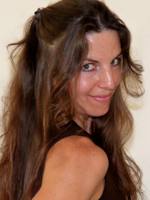
Ninety-Five Acres
by Amanda Pauley
Amanda lives in the Upper Roanoke Watershed, just a few hundred yards from the North Fork of the Roanoke River.

The valley woke up early, birds first. The shade of the ridges held onto a coolness until midmorning, when the heat burst free. At a gas station where the valley met the interstate, Sylvia stood with one hand on the pump, watching the numbers on the meter spin upward while she listened to the conversation on the other side.
“I heard they offered him over a quarter of a million for that land. Can you believe it? He’s already rich. What will he do with it all?” the voice said.
Sylvia knew what it meant. They had finally made an offer big enough to get Daniel Weaver’s attention. The old man’s property was at the neck of the valley, a stop gate at the edge of a rural community, warding off industry and progress. Rumors had been going around for years now. The newspapers spoke of it often: Possible Factory Location, or, Trade Jobs Needed, Commerce on Its Way. Sylvia thought they might as well have read: Rip Apart the Nature Preserves, Flatten Those Mountains, Technology Will Overcome and Pollute the Rivers. She had seen it happen in nearby Riverton. One factory. One commercial building. Then two. Then a hotel, fast food places, and a strip mall always followed. A rural area full of flora and fauna could be on its way out the door in the span of a couple decades. She thought of the tadpoles in the pond in the summer, young birds flying out of their nests for the first time, and the snapping turtles that, if they survived their youth, could live to be sixty, maybe more. She couldn’t let that happen to her land, her home.
***
Daniel Weaver had moved away from Burkette when he was eighteen. His father paid his college tuition, and he did not come back until he had created three companies, sold two, and made more money than most of the people of Burkette had ever seen. Daniel had married, but he lost his wife to cancer when he was forty-six. The next year, Daniel’s father died, and Daniel returned to Burkette to spend part of the year and to check on his mother in a local nursing home. He disappeared often to tend to his last remaining shipping company. He began renting out the pasture around his father’s farmhouse to local farmers for their cows and horses to graze. Several locals had jobs tending the place when he was out of town. Land preservation was clearly not a primary concern; part of his riches resulted from real estate development. After Daniel’s mother passed away, only a small feeling of nostalgia, which grew smaller by the year, had kept him from selling the place at lower offers.
***
Sylvia could see part of Daniel’s property from the gas pump. It started at the edge of the parking lot, which had been there since before she was born and somehow remained the only commercial venture in the area to exist. She thought about the time some twenty years ago when, not long after his return, Daniel Weaver had driven up their driveway. Sylvia had been seventeen and standing in the garden with a hoe, not hoeing. Denim shorts and long smooth legs. Black hair in a ponytail to her waist. An only child. Chores first, then swimming, her mother had said before leaving for the store.
Daniel had pulled up in his truck. He wanted to talk to her father, who wanted to pasture some of his cows on Daniel’s property. Sylvia’s father was not home either.
At this news, Daniel had hesitated, unable to look away from her, before saying, “I’ll come back. Tell them I came by, would you?”
“Did they fix your fence?” Sylvia asked.
“My what?”
“Your fence? After those kids ran their car off the road and took down your fence. Did they get it fixed?”
They had talked for an hour on trivial things like this, anything at all to stop time. They might as well have been creatures from different planets, but there was something in the air between them. Thirty years and five feet apart, neither one looked away from the other. At forty-seven, Daniel was attractive in an unusual sort of way, Sylvia had thought. She had understood him to be wealthy, but he appeared to have held on to some humility. She had liked the sound of his voice, the genuine smile, the way he moved, but especially his eyes. At seventeen, Sylvia had been waiting for a man to look at her like that. Two squirrels fussed in a peach tree next to the garden, and a dog barked insistently in the distance. A shining crow cawed time, and Daniel’s face changed.
“Tell your dad I’ll come back about the cows,” he’d said, moving quickly to his truck.
Sylvia never forgot the feeling of that undercurrent. Now, twenty years later, she was going to bet the house that he had not forgotten either.
She had seen his car earlier that week and knew that he was in town. She did not call ahead or drive a car. She walked, as she was apt to do, down the winding rural road. August heated the tar on the road, and she popped the bubbles with her shoes. She went past barns and cattle and small graveyards, and over the bridge twice replaced because of floods. She walked whenever she had the chance, and it showed. Her hair swung behind her, though no longer at her waist, still long, and just as black.
She walked by his Mercedes in the drive, and up the porch steps. Daniel’s farmhouse looked as it always had on the outside. Sylvia had seen Daniel over the years since their first encounter, a friendly wave on the road, a brief chat from an open car windows at the gas station, and he even came to the funeral home for her parents’ viewing after their accident three years ago, as a neighbor should. Sylvia’s parents left her fifty acres and a house which she moved into, all several miles of back roads away from Daniel’s place. She had been fortunate enough to have decent employment as a legal secretary for the last ten years in Riverton, and so had managed to pay the land taxes each year.
Sylvia knocked. He answered the door with a familiar smile that now had sixty-seven years behind it.
“Have a seat, have a seat. Would you like something to drink?” he asked.
“Yes, thank you,” she said, just to see what he would bring.
He brought iced tea and whiskey, and she was relieved. They had both, and he showed less surprise at her request than she expected.
They would meet, day after tomorrow, at his place. She could park in back, out of sight of the road. They would use the guest bedroom. Sylvia wondered whether this respectful stipulation had to do with his deceased wife or the fact that this had been his parents’ home. He would have the paperwork minus the forthcoming signature. No lawyers were necessary, and each would trust the other to play their part. He asked that she wear a skirt and heels. She asked that he include all three barns and the tractor in the deal. They both agreed to give each other everything they had.
Later that evening, Sylvia sat in her kitchen with a glass of wine. She did not drink it, but looked into the redness. She was telling no one of their bargain. At first, she had thought that might be important, telling someone. If he did not hold true to his word, it might take someone else’s insistence or aggravation or warning of exposure to hold him to it. But then, he was sixty-seven now and perhaps a different man than he was twenty years ago, when his restraint was caused by what? Morals? Social opinion? The shriek of a crow? Whatever it was, it had kept him from doing something he might have regretted. This was different. After all, she had made this request.
She swirled the wine around the glass and came to the conclusion that the only way to hold him to his word would be her complete participation. She would not get away with lying still or focusing on a far away object. She was going to have to give the performance of her life. Sylvia thought of her sort-of boyfriend. She and Joe were more like good friends that occasionally wound up in bed together. There were no fireworks, and as of yet, no commitment on either part.
She walked outside onto the back porch and the humidity touched her while she looked up at a moon not yet full. She went over what she knew, what might work, what he might not expect, what he might like. She was no stranger to sex. She was a stranger to sixty-seven year-old bodies. The oldest man she had seen naked so far had been forty-three. She imagined translucent skin and brown spots, sagging parts. She took a drink.
***
At the neck of the valley, Daniel sat at a table in his farmhouse, going over his accounts and upcoming meetings. He was no stranger to sex either, but he had not performed the act in five years. He sat on his couch that evening with the newspaper in his lap, not reading. He doubted she would go through with it. Then he doubted that he could go through with it. Did he really want her that bad? To give up land worth a quarter of a million dollars? If it was a matter of sex, he knew where he could get experienced women, younger women, for well below that price. But they weren’t her.
For a moment he felt ashamed, then insulted. What kind of person makes an offer like that? What did she think of him? Did she really care that much about the land? He was not sure whether to admire her or to scoff at her concern for the valley. Did she think she was worth all that? She was beautiful and looked years younger than he knew she had to be. In fact, to him, she did not look all that different from that moment in her parents’ garden twenty years ago.
It was that moment that decided it. He realized that he had never known another moment in his life when he had wanted something so much and could not have it. Besides, she had made the request with such humility. She had seemed truly desperate and had shown him as much respect as one could show when making that kind of offer. He could give her the land for nothing, if he wanted. He laughed out loud in the quiet of the farmhouse when another option occurred to him. He could go through with it and still not give her the land. At this, he laughed until tears ran down his cheeks. The joke was on him. He wouldn’t have turned her down for anything. He supposed the joke was on her, too. Her bid had been too high. He’d have given her the world for one long embrace.
Daniel leaned back in the chair, closed his eyes and entertained the idea that maybe there was more involved than her need for the land. Did she remember the feeling between them that day so many years ago? He had never forgotten that golden hour, the way she had looked at him.
***
Sunday morning came. Sylvia woke and remembered what day it was. What day it would be. The land would be hers, and she would yoke the neck of the valley in a conservation easement as soon as the ink dried and she could take a shower, forget how it had happened, and get the papers to an attorney’s office on Monday morning.
She went through her Sunday routine. She called Joe to say she needed to get some things done today. A friend called and she declined an invitation to dinner. She did her laundry, cleaned her house. She cut out coupons. She called Daniel at seven-thirty that evening.
“Should I still come?” she asked.
“Yes,” he said. He almost added, please, but didn’t.
She drove this time and parked behind his house. She walked up the back steps. He was waiting just inside. He looked at her through the screen door. She wore a short black dress and red – oh so red – high heels. He invited her inside. There on the kitchen table was an open folder with papers and a pen. No lights were on. The evening sun still reached inside with long fingers. Sylvia sat down on the on the sofa and crossed her legs, letting one shoe dangle from her foot. He watched in clear appreciation of the dress, a very little dress. Sylvia wondered if he was surprised at how relaxed she seemed. She knew she was.
He went to get them a drink and came back with a look on his face that made her say, “No guilt. My offer, remember. An exchange. It’s to be enjoyed by both of us. It won’t work if there’s regret,” she said. “Can you do it?”
He said that he could.
Sylvia had imagined what a sixty-seven year old body might look like, feel like. She had prepared for this. After two drinks, she felt the catch release, the okay from the back of her brain, and she leaned in to the lips she had stared at for one hour of her life years ago. She closed her eyes and went there, to the heat, the sunlight, the half-hoed garden. She ignored the crows and barking dogs. She felt her long hair once again touching the small of her back as she moved, and the dirt under her bare feet. She thought of how his face had looked, shaven, strong, and warm. Rolled up sleeves showed forearms, tanned and hairy. He had watched her, not looked, but watched her as she spoke. She remembered that impassible distance of thirty years that had felt exotic, and the five feet of soft soil between them, and before she knew it they were in his bedroom in the dark and she was making love for the sake of mountains and valleys and two-hundred year old oak trees and coyotes that howled from the ridge tops, and red-tailed hawks, and cedar waxwings and fat, soft otters. She was doing this for the land, for preservation, for a twenty year old crush, and she forgot her plans, what she had planned to do to him, which room they had agreed on, and she went somewhere unearthly in the moment. Daniel followed.
What was supposed to be over quickly, initially was, but there was carryover, and time in between, and three hours later they emerged from the bedroom on the creaking planks of the hardwood floor. Daniel retrieved two glasses of water for them, and then two more. Sylvia sat down on the sofa. He remained standing, downed the second glass and reached for the folder. He signed three places and showed her where to sign also. His hands shook. Her entire body relaxed. She signed the two copies, and took hers. He walked her to the door. Sylvia stood for a moment on the small back porch looking up at the moon before she turned around to Daniel.
“Goodnight,” he said.
She nodded to the face she had come to know so well in the dark. She went home, but instead of rushing to shower, she sat down on her own sofa with the papers in one hand, took off her red heels with the other, leaned back and rested in the dark, listening for the caws of the crows, the blue-black crows.
***
Perhaps it was the memory of desire from so many years ago, or the explosive exchange of power that she thought sex could sometimes be, or seem to be, or even the enormity of what was at stake and the secrecy of it all, or maybe it was just the sweetness of an official act of trust between two old acquaintances. It was doubtful, if either would ever know. The fact was it would never happen again between them. Daniel moved to a nice apartment in a complex he owned in a city two hours away where he still had a couple of old friends. He revisited their transaction every day for the rest of his life.
Sylvia got the property and soon after a conservation easement. She also made quite the gossip for a while. No one ever guessed exactly why she was suddenly the owner of Daniel’s ninety-five acres. She never regretted their agreement, despite the unexpected tradeoff it had become. She loved the land, and it was good thing she did, because she never had sex like that again. She would try over the years, with many men, in many ways, even women just in case. The act was still fun, even touching on occasion, but she never moved the mountains quite as far again from underneath the sheets. She did slow – not stop – but slow the progress and construction in the valley by almost two decades, before a factory, several restaurants, and hotels started to creep in by other means. She had bought them some time. The young otters played, and the red-tailed hawks flew high. The coyotes howled a little longer.
© Amanda Pauley
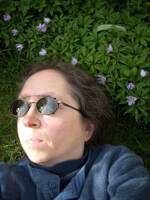
Alchemy of a Wetland
by Rebecca Alexander
Rebecca lives in Seattle's Lake Washington-Cedar River watershed close to the Wedgewood erratic, a massive serpentinized greenstone.

the flicker is the answer
to the riddled apple tree
bestrewn with gauzy tents
the barn owl in daylight
is a pallid crow-pocked moon
shadowed by dragonflies the dog traces
the hidden mouth to the grass path
through a tunnel of dappled poplar saplings
where by night coyotes howl untrammeled
invisible history seeps and suffuses
the roots of wild aster and woolly vetch
threads the leaf capillaries of bird’s foot trefoil
fuels the elemental radiance of brazen yellow broom
acts of survival and of vanishing
recede and surge and tumble
this imperfect alembic chortles
blurts and shrills its song of contradictions
tip the vessel to turn the tide of humankind-ness
on the fringes of the constructed wetland
the droning tools of demolition and re-creation
raise their sundering hue and cry
the Great blue heron dips its beak into the pond
a sorrow-sipping retort drawing up
the groundtruth of tainted marshwater
but tilting back into the fickle sky
a silvered minnowful of kicking verve
and death-defiant breath
© Rebecca Alexander
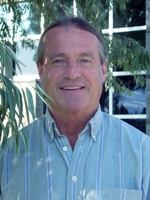
Ants
by Lowell Jaeger
Lowell lives and writes on the shore of Flathead Lake (the largest freshwater lake in the continental states west of the Mississippi) in the center of the Flathead River Basin. He spends his summers hiking in the nearby Bob Marshall Wilderness and Glacier National Park.

Ants do what ants do: hive
in crumbling rocks and cracks, build
villages in my garden wall, frenzy
through daily routine in what looks to me
as rushing to and fro for no
discernable cause — from where I stand,
just now alert to this nation’s invasion
into my own sovereign soils.
A bugle
wails its alarm, calling me to march
to the garden shed, survey the stores
— powders, sprays, bombs —
arm myself against this foreign assault.
In the blast of afternoon heat, the ants
zigzag, lofting bits of leaf and bark,
the queen’s orders relayed —we think—
in chemical codes of one’s antennae wiped
across another’s. Do they suspect me?
Do they see me? How can they comprehend
the impending doom
raining down
from my shaker of Bug-B-Gone,
guaranteed to rid any garden and lawn
of creatures unwanted. The napalm
burns into their polished uniform hides.
Some run, some collapse, some writhe.
I bulldoze their bunker with my shoe,
over-ending stones beneath which lie
nurseries of the unborn, a next generation
assigned to care and feed the future hive, till
my shadow looms overhead,
and I’ve put an end to all of that. Which is natural,
isn’t it? Ants do what ants do.
My species too.
© Lowell Jaeger

Back Away, Slowly
by Lowell Jaeger
Lowell lives and writes on the shore of Flathead Lake (the largest freshwater lake in the continental states west of the Mississippi) in the center of the Flathead River Basin. He spends his summers hiking in the nearby Bob Marshall Wilderness and Glacier National Park.

A radio news report:
bears invading the suburbs,
foraging for dumpster pizza crusts
instead of wild berries and nuts.
A few neighborhoods brazenly
bait the hairy beasts with table scraps,
snap photos, blog to friends. One
especially enlightened housewife
has evolved to where she swears
she longs to embrace Yogi
eye-to-eye and read his “soul.”
I’m only listening sideways
as I drive, and shiver a bit
to imagine Cindy Cul de Sac
fluttering her eyelids
at the tall dark stranger
who’s ripped apart the bird feeders,
shredded her garbage for morsels of steak.
A bear’s nose provides
a window to his soul, if
he’s got one. He’s seduced
by a putrid carcass bloated with rot, abuzz with flies.
He’s no sentimentalist.
I tremble on a narrow wilderness trail,
traversing blind switchbacks.
He’s no lover of surprise.
© Lowell Jaeger

Dead Ball Era
by Dan Jacoby
Dan's family has lived in Macoupin County, Illinois, for about 165 years. Western Mound has Bear, Lick, Hodges, and Solomon creeks emptying into Macoupin Creek which flows into the Illinois River and eventually into the Mississippi River just above Alton.

south of the hard road
on a lost ball diamond
phantom ball players
play a game of catch
in their youth they
drove balls high
into surrounding oaks
made catches running
over shards of ancient arrowheads
ground balls gathered and
thrown like wind astray
into an ancient forest
coming to rest
near once sacred graves
played under a fire pool of stars as
chanting coyotes kept score and
only the corn knew and still knows
with ears listening
as a clickedy clack clack
of ghost railcars long abandoned made
long low whistles that
echoed off the hills and bluffs
in lick creek bottom
First published in Vehicle/Summer 2014
© Dan Jacoby

For Leonard Peltier*
by Linda Benninghoff
Linda lives in the Northern Long Island Watershed in back of Caumsett State Park and less than a mile from the Long Island Sound.

The old lived out of their cars
and never wanted houses, money.
You chose the land over the money
the government offered for the land,
and the land seemed to answer you back,
without greed, without hurting you,
the young doe flicking her ears
beside her mother,
the rabbit, and the spirit of the rabbit
following with gentleness,
the lumbering raccoon,
with squall and the sacred
in his night-sound,
your knowing the land
contained peace, and it
came from the ancestors,
descending like rain,
and was for the descendants, on.
*Peltier was a leader of the American Indian Movement in the 1960s and 1970s. After a desperate shootout with the FBI in 1977, he was sentenced to two consecutive life terms in prison. He is 70 years old now.
© Linda Benninghoff
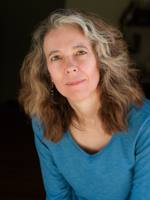
Ghost Hive
After colony collapse disorder surfaced around 2005, the losses approached one-third of all bees, despite beekeepers’ best efforts to ensure their health. - NY Times, 3/28/13
by Erica Goss
Erica lives less than a mile from the Los Gatos Creek, home to a variety of migratory waterfowl and a former homeless encampment.

If they were dead
we could understand it:
compound eyes gone flat
abdomens dry and crisp
but they vanished
like the pictures I made as a child
like my imaginary friends
like my father – gone,
as if there was nothing
left between us – gone,
like sweetness
fading from the mouth
leaving us with nothing to mourn
and no one to punish –
we clean the hive
again.
© Erica Goss
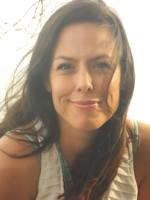
Grass Dancer
by Rachel Jamison Webster
Rachel lives within walking distance of Lake Michigan's beaches. She grew up on Lake Erie, on a ridge that was once the shore before the lake receded. There, in her sandy backyard, she found flint arrowheads and cooking tools from the region’s earlier residents.

We were the ones who entered the circle first, who tamped down the grass for the jingle dancers, the crazy dancers, and the grandmothers. The denting was a kind of dull stinging, a kind of being alive. The dance would leave a green seeping all over your feet, the juice of the grasses brightening the soft soles of your moccasins. And you could felt the grass singing as it was flattened, its life entering the suck of your feet, moving up the rising rivers of your legs and out again, into the stars that were your hands. That was being alive, that was life, the way you could thank the sun sinking into you. The way you could feel the life of the grass that drank the sun and rain, wanting to give and give itself to life. The earth was threading up into you, you who you were with the others, the earth.
© Rachel Jamison Webster
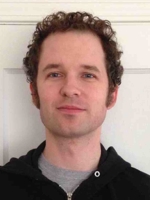
How to Fell a Tree of Heaven
by Cal Freeman
Cal lives and writes in Dearborn, Michigan, in the Rouge River watershed.

Call it a colony of carpenter
ants, spent circuitry
of lenticel and root,
volunteer tree, sucker,
this, a tree of heaven;
cavities in rotten wood,
ailanthus altissima, Rhus
succedanea, stinking
sumac, ghetto
weed, naming
one requisite for destruction.
Press an ear to the trunk,
hear it buzz
with a thousand mandibles
Watch the chainsaw follow
pheromones into the tender
spots, break into dust
at the incision.
© Cal Freeman
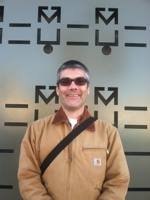
Lawn
by Tom Molanphy
Tom lives on the Vista Grande watershed of Northern California. Some complain about the sea fog in the area, but he remains grateful for the free air conditioning.

Miguel wears camo pants and drinks a Miller Light. He is Latino and stocky and flashes a gold-toothed smirk my way. Phillipe, my tall and flamboyant French neighbor, holds a glass of wine and leans over his brick wall. He shares Miguel’s skepticism about my lawn project.
“Come over for wine after zat craziness, oui?”
Of all my neighbors, Karen’s opinion means the most. With a Protestant work ethic as dependable as our coastal fog, she has lived in this quiet San Francisco suburb for years. I know she’s a widow and has a very sick son; she complains about neither.
Since exchanging our customary garden-gloved waves, we’ve both been working on hands and knees. While she adds supplements to her rose bushes, I subtract my entire front lawn.
I cut and roll over sod, section by section. The earth is so dry I can’t tell where the paper-feathered grass ends and the dust begins. No surprise: The San Francisco Chronicle recently confirmed that California is suffering through one of its worst droughts in history. The Sierra snowpack, the Bay Area’s major source of water for drinking and agriculture, is 17% of normal. Governor Jerry Brown has dubbed it a “mega-drought” because it’s the result of multiple dry seasons. And since California produces nearly half of the nation’s fruits and vegetables, it’s hardly a regional problem.
Miguel, Phillipe and Karen watch me. I like them all very much: Karen for her hard-nosed approach; Miguel for his zest; and Philippe for the duck-covered pajamas he wears when he washes his car on Saturday mornings.
I wonder what they think of me. I’m white, early forties, married but with no children. I stay at home a few days a week to teach online classes. I sport the heavy dark spectacles and two-day old shave of a Silicon Valley tech worker. Maybe they believe that’s my culture, the “techies” who have poured into the Bay Area to catch the latest Gold Rush, pushing rents to unreachable heights and jamming downtown with “Google” buses. Maybe they think tearing out a lawn is just another hip trend for the young and foolish.
Miguel beckons me over with a friendly wave of his Miller Lite. I wave my hand-shovel, then point to the ground. He smiles and resigns himself to his beer. I dig my shovel into the earth, crunching the coastal mix of soft sand and dry clay. I like the feeling, so I keep digging. I dig for the same reason I write: to understand what connects us.
Karen crosses the street and enters what’s left of my yard. I stand up and dust myself off. She wears faded dungarees, and her gray hair is pulled back into a tight bun. Her blue eyes outshine the clear sky.
We share a space for a small time. So much about the crowded Bay Area concerns sharing space. Grey whales traveling south down the Pacific Coast share travel lanes; neighbors share fences; native seedlings intertwine their roots and share the spaces we can’t see.
I decide to state the obvious.
“I look pretty funny here, huh?”
Karen keeps her eyes on my project. I can’t read her face.
“What are you up to?” she asks.
I tell her my lawn has beaten me. I can’t stop the salty fog from keeping the grass in a continual state of mutt-matted brown. I can win brief skirmishes with fertilizer and pesticides, but then I have to watch the resulting run-off stream down our street. That run-off would eventually reach the Pacific Ocean, a tiny sliver of blue just within sight of my home. Just out of sight lay the Farallones, and I could imagine the pesticides and fertilizer streaming out to those islands. The increase of nitrogen could create dangerous blooms of algae where blue whales and great white sharks fed.
It was enough to make a person stop and think.
“Go on,” Karen said.
I showed Karen how I had cut and flipped the lawn into two mounds, adding dirt to counter the high nitrogen content of the decaying sod. I had staked jute-netting into the mounds to hold the earth together on our slightly inclined yard, then covered the mounds with free woodchips that the county stumpgrinder was only too happy to get off his hands. A gravel path wound around the mounds. Once the mounds had broken down, I’d cover them with California poppy seeds and an array of native plants, including ceonothus, lavender, and fuchsia. The native plants would attract white-crowned sparrows, yellow-bellied warblers, Anna’s hummingbirds, and bumblebees. I’d have a whole new ecosystem instead of mutt-matted brown.
I finished my practiced speech and returned to the obvious.
“I guess it still looks crazy, huh?”
Karen put her hands on her hips and considered my lawn. I’m desperate to impress her because she’s so impressive. She’s a third-generation San Franciscan who doesn’t stand any nonsense. If Philippe plays his French records too loud, or Miguel lets his ivy clog her fence, they hear about it.
Karen was around during the last severe drought, 1976-77. That two-year drought was worse. Reservoirs got so dry that an emergency water pipeline had to be built across the Richmond-San Rafael Bridge. Both droughts have been hard on fish; just last week, juvenile Chinook salmon were trucked past dry creek beds to give them a shot of reaching the Pacific. But neither drought can compare with the one recently reported in Time magazine: a California drought that started in 850 AD and lasted over 200 years.
I see the hard light of judgment flash in Karen’s eyes. She turns back to her roses but answers my question over her shoulder.
“Better to worry about water than to worry about how things look.”
Miguel beckons Karen to visit him, but she waves him off. Phillipe calls over to remind me about the chilled chardonnay, and I promise to join him.
Then I drop to my knees to work.
Previously appeared in Neutrons/Protons
© Tom Molanphy
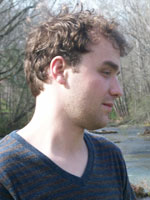
One-Man Renga in Late June, Lee County
by M.P. Jones
M.P. lives in Gainesville, Florida's urban Possum Creek watershed, where he works, writes, and raises backyard chickens.

Outside, thunder boasts
an impotent rain. Who stood
amongst strawbriars
with shadows growing long and
the day smooth in its lateness?
Why ask with words what
this world is for? Recalling
the winter we left
the oven on to keep warm,
fed our bills into the mouth
of a woodstove, one
by one, watching them tremble
and darken, then burst.
It is I who have walked
through overgrown paspalum
in air so thick that
each breath filled me with dark dreams
of mossy water.
All the way up the path home,
twisted as those ruined hallways
where the dead open
like blue doors in the forest,
amber knobs you fear
turning. Past the garden gate,
with night falling everywhere
where we stood, screaming,
when it was all we could do
just to draw some heat
between us, after late shifts,
driving home in dark flurries.
At the high hilltop,
the bees have not disappeared
from the possumhaw.
Why do we ask with words when
the air is thick with their song?
Forthcoming in the author's collection Reflections on the Dark Water, spring 2016.
© M.P. Jones

Pallid Sturgeon
by Taylor Brorby
Taylor lives near the South Skunk watershed and, every now and again, catches glimpses of restored tallgrass prairie.

You are the armored tank of the prairie
a letter from the dinosaurs.
Sliding in silt you sift your way to the riverbed
hunker down, slurp roots and minnows
through your vacuum mouth.
Five rows of plates plank your side and back
creating a 70-million-year seal of safety
until now, oil swirling in the eddies of rivers,
gateway to extinction.
Your black eyes gazing into tomorrow,
you warm with the whiteness of old age
a century of certainty behind you,
swim through the maelstrom,
to the end of compassion
your certain demise.
© Taylor Brorby
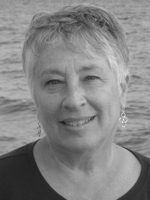
Reacting
by Gail Thomas
Gail lives near the oxbow of the Connecticut River along a flight path for hawks, eagles and herons.

A year after the earthquake that
triggered a tsunami and cracked
reactors in Japan, a researcher
said, We were kind of startled,
by the mighty bluefin tuna
carrying radioactive
contaminants across the vast
Pacific to our shores.
Swimming breakneck over
6,000 miles of ocean, the fish
sought a spawning ground
and scientists waited
for some rough beast gliding
toward Big Sur.
Years ago I camped among
the wildflowers there
with my lover who came from
a small New England town.
She died at 31 from
a brain tumor as did others
in her town down river
from an old reactor. Last week
a 90-year-old woman
chained herself to
its rusted gate.
First published in New Verse News
© Gail Thomas

Robbing the Hives
by Kevin L. Cole
Kevin lives in the Lower Big Sioux Watershed, along the Big Sioux River in Southeastern, South Dakota.

With a smoker and putty knife, our father
Pried open the lids of the Langstroth hive-box,
The supers sealed tight by the good work of drones.
Even five feet away we could feel the heat
Of the hive and smell the heat of the honey
And of the bees’ three seasons of industry.
Our father, without gloves or mask, lifted
The nine frames one by one, gently shaking
Them so that the bees spilled back into the hive.
Then with the delicacy of a medieval scribe
Bearing a sacred illuminated skin,
He transferred the frames to my brother and me.
We were ignorant of Marathon then,
But we ran those frames to the kitchen
As if we held the city’s fate in our hands.
With a heated knife, our mother sliced across
The myriad, turgid cells, casting the cap-wax
Into Mason jars we wouldn’t open till winter.
Then, when the slinger was loaded, my brother
And I leapt on top of the kitchen table,
Clasped our hands over the cast iron handle,
Struggling to crank the reluctant basket.
But faster and faster we cranked, and laughing
Slung the honey from its cellular harbors.
Now, there is little want in this life—
Only that you were not there to peer over
The lip of the slinger and watch the honey
And afternoon light stream down the galvanized barrel.
© Kevin L. Cole

Still This Way
by Meredith Ferrill
Meredith lives two miles inland from the vast freshwater basin of Lake Michigan, which provides drinking water to millions, on the banks of the heavily polluted Chicago River.

In a restaurant carved into the
craggy hills, sitting at a seaside
table, my mom and I looked down
over Vernazza, its mauve, pink,
and egg-shell blue buildings circling
the shore like painted teeth, its
electric tide throbbing up to sand,
splashing over black knobs of stone.
That morning, we had hiked from
Vernazza to Corniglia, leaving
the quiet village still ghosted with fog.
At noon, we had returned to find
the village ablaze with summer sun.
Admiring the beauty, we ate crawfish
from a steel pot, laughed and rested
our feet, tired from the climb. I still
picture it this way, Vernazza, the perfect
geometry of the cliffs, the joyful cries
of color, the mountain trails dusted
with white flowers. Even when I’ve
read of the storm, how the rain beat
on violently, sending trees, cars, lives
into the sea, even when I’ve seen
pictures of the devastation, the mud
waist-high, gumming the walkways,
waves quiet and opaque with debris,
streets buried and archways stuffed with
colorless sand, still, I see the place
as I saw it then, frozen in those safe
shards of memory, unblemished
and unscarred by the falling hills.
© Meredith Ferrill

The Day We Toured Venice
by Meredith Ferrill
Meredith lives two miles inland from the vast freshwater basin of Lake Michigan, which provides drinking water to millions, on the banks of the heavily polluted Chicago River.

The rain started within an hour
of our arrival in the painted city.
Clouds, colorless as steam,
blank as undrawn pages,
merged above clay-colored rooftops
and began spilling drops
over slick, sunken streets,
pelting the green, oily water
in heavy and refreshing streams.
This is not how we had hoped
to see Venice: Piazzas flooding
in stone-locked corners, abandoned
gondolas like burnt-black crescent
moons, moored to empty steps,
windows boarded, lonely canals
baptized and rising, water eating up
the sides of crumbling, pink walls,
walls already etched with lines of decay
showing where the water has been,
whispering where it will go.
© Meredith Ferrill

The Peacock
by Brian Heston
Brian grew up in Philadelphia, which lies along the banks of the Delaware and Schuylkill rivers.

In the parking lot of Paradise
Convenience in Gainesville,
we searched for your car keys
in a pre-deluge haze.
I hadn't seen you for weeks:
my afternoons spent watching
talk TV, my nights working
graveyard shift. You showed up
without warning to drive me
home. I rummaged my pockets
for those keys, even though
I knew you hadn't handed them
to me. You checked your purse
again, then peered through
every window of your Toyota,
trying to find their faint
glimmer somewhere inside.
The filthy swelter clung
to us, heat lightening brightening
the sky, the peak of Florida
summer, the weather forever ready
to storm. You decided
to retrace your steps. I stayed put,
wondering how to tell you
I was fleeing back to Philadelphia,
away from these buildings
of aqua, these long pale pavements—
the gunmetal Atlantic. When we
first made love, we talked
of South America, living Spartan
in some mountain village.
Now you only spoke of houses
and fences, an animal need
to avoid danger. While waiting
for your return, I heard
what sounded like a woman
screaming. I looked around
the empty lot, but found only
the store’s dumpster. Then out
of the rotten-cabbage dark
stepped a peacock,
his tail feathers shimmering
in the light glowing past
the store’s glass doors.
I didn’t see you come back,
but I could feel you watching too
when he wrenched himself
from the pavement and flew,
laboring his way into
the soupy air just above
Route 20 to the live oaks
on the other side, where he
quickly sank and disappeared
into the dank impenetrable brush.
© Brian Heston
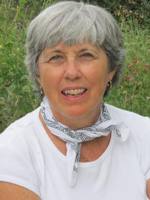
What Saves
by Charlene Langfur
Charlene lives in the northwestern extension of the Sonoran Desert, 224 feet above sea level, in one of the hottest places on earth, with only 5 inches of annual rain and temperatures as high as 120 degrees. She is just south of the Whitewater Preserve, 93 miles west of the Pacific Ocean.

This year the plant on the porch bloomed
as if nothing could stop it,
Mums, a running bloom of them
nothing complicated about this,
no precision growth involved,
only the flowers, light purple,
maybe lilac in color, all of them
more ambitious than usual, soft yet dark,
I can feel the ease of regularity
from inside the house because of them
because they are there,
steady, unexpected,
a single touchstone of a life
gone suddenly backwards, yes,
it was all of a sudden things turned difficult for me
and I had no reason at first
to believe the flowers were any kind of staying point,
the reprieve they had become, the line in the stand stopping
me from being pushed backwards any further.
A clump of chrysanthemums,
a plastic pot of them from Trader Joes, a holiday deal.
A one way special to christen a new
apartment, flowers gone to seed and back,
gone to transplant and more.
The small light in a big dark.
Soon it will go at it again, the plant,
flowering when I least expect it,
when it should not have any more
in it to do, it will be what saves when all else fails.
A crescendo of purple flowers,
what saves comes back.
Enthralls. What makes the too deep light again.
© Charlene Langfur
Wonderland
by B.T. Baker
BT lives in the Minnehaha Creek watershed in Minneapolis near two lakes, the Mississippi River, and the glorious Minnehaha Falls.

We were pathetically modern humans.
Some friends had generously given me and my wife Amy the use of their cabin for a weekend. Here’s what we thought we needed to survive for 36 hours: a cooler full of food, two big brown grocery bags stuffed with snacks, and a pair of suitcases bulging with clothes, toiletries, and other items that we couldn’t live without. We also brought our dogs. They didn’t pack anything.
The cabin was a three-hour drive north from our home in Minneapolis. We stopped halfway so the dogs could relieve themselves in a patch of grass at a truck stop, and then we continued on, metropolitan life receding behind us. We turned off the highway and followed a series of dirt roads until we arrived at the cabin. It was a simple, brown, one-story structure set deep on a large lot, secluded and private. The backyard sloped sharply toward a lake. The yard was filled with tall pine trees and the air smelled like fresh sheets.
The cabin was simply but thoughtfully designed. The front door opened into a large, white, light-filled kitchen. There was a screened porch on one end of the structure and a bathroom sandwiched between a pair of bedrooms near the front. The back half was dominated by a large living room with a wood floor and wooden walls. Rustic furniture was arranged around a stone fireplace. A wall of windows looked out over the lake, which shimmered like blue glass in the morning sun.
And there we were. There was no television, no cell phone coverage, no Internet, and no computers. We were completely disconnected. Off the grid.
Contrary to conventional wisdom, I think technology has made us more disconnected – from our true selves, from nature, and from each other. People often say, “We’re Facebook friends,” which is the same thing as saying, “We’re not really friends.” Social media weakens the concept of friendship by emphasizing quantity over quality; it’s not the depth of one’s friendships that matter but merely the number. Face-to-face interactions are vanishing as everyone becomes self-created characters competing for attention in cyberspace, but every ounce of energy invested in an inauthentic online self creates a more hollow self in ordinary reality. At the cabin, gradually time began to downshift. Freed from the addicting grip of technology, I began to relax.
It got hot in the afternoon so we went down to the lake. Amy swam out to a floating dock while I stayed onshore. When I was a boy I struggled through years of swimming lessons. It was torture at every level – Beginners, Beginners II, Advanced Beginners, Intermediates, and Swimmers – I failed them all. My problem was simple: I was a coward. I was scared to get in the water; and when I finally got in I was scared to let go of the wall; and when I finally let go of the wall I was scared to put my head underwater; and when I finally put my head underwater I was scared to swim; and even after I learned to swim I was still scared to jump off the diving board.
Picture me then, standing at the end of the diving board as it bends and bounces beneath my feet. My knees are knocking. A long line of kids waits behind me, eager for their next chance to plunge in the pool. My teacher is treading water, ready to grab me and keep me from sinking. She encourages me to jump in, but I’m frozen at the end of the board. I stand alone, all eyes on me, my skinny legs shaking, the board flexing beneath me and making me queasy. The kids waiting behind me are losing their patience. One of them yells, “C’mon, you pussy – hurry up!”
Fine, I’m a pussy, but at least I’m a somewhat clever one. I retreat and walk down the steps of the diving board, and I tell my teacher that I need to use the bathroom. I dash inside the boys’ locker room, where my female teacher isn’t allowed. She won’t see me again until the next day.
Back at the cabin, I took our dogs to the end of the dock and encouraged them to jump in the water. Our yellow lab looked nervous, but our carefree golden retriever plunged in. And promptly started drowning. She had no idea how to swim – she was upside down underwater, panicked, flailing away, and sinking like a stone. Fortunately Amy was there to pull her to the surface and carry her back to shore. I toweled her off and reassured her that, “if Amy hadn’t been in the water to save you, I would’ve pushed her in.”
In the afternoon we took the dogs for a walk, following a dirt path that encircled a wooded area. We strolled along until the dogs froze, on high alert, ears and tails pointing straight up. I looked ahead and noticed what had their attention: three deer were standing in the road about 100 feet ahead of us. I’ve read about people waiting in line for hours to get the latest electronic gadget, and while I’m sure that experience provides temporary euphoria, there is no way it can match the wonder we felt quietly observing and admiring that family of deer, Nature’s most graceful of creatures.
It took less than a day of being in nature to unwind my tense urban self. When you walk beneath towering pine trees that sprouted long before you were born and will probably stand long after you’re buried, it quickly puts things in proper perspective: You are insignificant and your daily concerns are mostly trivial.
• • •
When I was nine years old, my grandma, whom we called Nana, took my sister and me to our family cabin for a week. It was a heroic effort for a woman in her late sixties. After we arrived, my sister and I immediately started playing a board game, leaving Nana to haul in a week’s worth of supplies by herself. The cabin was raised a story off the ground to protect it from spring floods, and every time Nana lugged heavy bags up the ten steps that led inside, we paused our game and pestered her: “Are you done yet? Can we go to the beach now?”
When Nana finally finished unloading everything, she collapsed in a rocking chair. Instead of letting the poor woman rest, we badgered her relentlessly. “Will you take us to the beach?”
“Just let me rest my eyes for 15 minutes.”
“Are you done sleeping yet?”
“Give me a few more minutes, kids.”
“How many minutes is a few?”
“Why don’t you put your swimsuits on?”
“They’re already on! Can we go now?”
We were just as intolerable when Nana finally took us to the beach. She sat patiently while we poured river mud all over her back. Then I took a stick and wrote GRANDMA GRUNT in the sand.
Nana endured six more days with us. The woman was a saint. One night I awoke to see her swiping at the ceiling with a broom. I asked her what she was doing. “Oh, there’s just a bird in here,” she said. Years later I realized that the “bird” was a bat.
Our cabin provided little more than basic shelter: a cold-water faucet in the kitchen, a wood furnace, and a two-seater outhouse in which a pair of kids could have exceptionally immature conversations. The cabin didn’t have a TV, so our days were filled with reading books, playing games, going to the beach and walking in the woods.
When the week of fresh air and grandmotherly love was over, I hugged Nana tightly and then got in my mom’s wood-paneled station wagon to go home. I buckled my seatbelt and looked out the window. I waved at Nana. She blinked. The cabin wasn’t much to leave behind – a dilapidated and decaying structure with a leaky roof and no toys. It hardly seemed a wonderland for a child. So why did I have a lump in my throat?
• • •
In the evening Amy and I closed most of the windows in the cabin because there was a chill in the air, the first breaths of autumn. We read books under the glow of two small lamps. We went to bed when we felt tired. We had no idea what time it was.
In the middle of the night our lab was restless, pacing, licking his paws, unable to settle down. I got out of bed and took him out into the dark night. Unpolluted by city lights, the sky was a deep black canvas painted with a million sparkling stars. A full, round, white-orange moon hung in the sky like an ornament. A wolf howled in the distance. I thought about how I couldn’t outrun a wolf dressed as I was in nothing but underwear and flip-flops.
After our lab finished sniffing around and peeing, I brought him back inside the cabin and immediately fell into a heavy sleep. I awoke before dawn, feeling refreshed. I fed the dogs and took them for a long walk in the cool morning air. After we returned to the cabin, I brewed a pot of coffee and lit a burner on the gas stove. I put four thick slices of bacon in a cast iron skillet. I left the burner on low. I wasn’t rushed. I didn’t have an agenda for the day. With the dogs lounging at my feet, I was content to sit at the kitchen table and sip coffee and enjoy the smells and sounds of the slow sizzling bacon.
Amy wandered into the kitchen as the sun peeked over the hills on the far side of the lake, illuminating a lone fisherman leisurely guiding his boat, making gentle ripples in the water. The little waves rolled along slowly, enjoying their journey, in no hurry to reach the shore.
© B.T. Baker